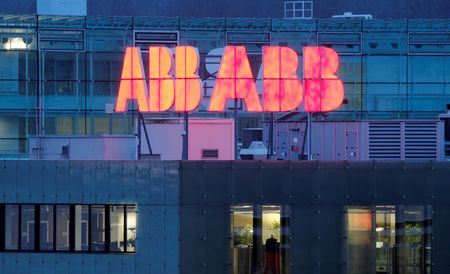By John Revill
ZURICH (Reuters) – Swiss engineering company ABB expects demand for its products to “normalise” during 2023, it said on Thursday, after customers built up stocks and pre-ordered to avoid supply chain disruptions and component shortages last year.
The company, whose products range from electric chargers for cars and buses to industrial motors and drives, also posted fourth quarter earnings of $1.13 billion, ahead of market forecasts.
Its shares were indicated 0.9% higher in Swiss pre-market trade.
“Looking into 2023, we currently do not anticipate a major set-back in demand, although the high inflationary environment adds uncertainty,” said Chief Executive Bjorn Rosengren in a statement.
He said comparable order growth would in the first half of the year be affected by “last year’s very high order level coupled with a normalization of customers’ order pattern.”
Still, ABB said it expected a strong start to 2023 as it worked its way through a $19.9 billion order backlog.
During the first three months of 2023 ABB said it expected comparable revenue growth in the double-digit percentage range, and of more than 5% in the year as whole.
Comments from the company, whose products are used in many factories, transport and infrastructure projects, are closely watched as a pointer to the health of the broader global economy.
Industrial automation peer Rockwell Automation last month raised its full year sales guidance, reflecting its results, order backlog and improving supply chain situation.
ABB’s fourth quarter earnings were boosted by a gain from the sale of its remaining stake in its power grids business to Hitachi in December..
Quarterly revenues rose 16% on a comparable basis to $7.82 billion. The new order intake increased 2%, compared with 16% in 2022 overall.
ABB said activity was improving slightly or stable in most customer segments, barring declines in residential construction and discrete manufacturing.
Orders were increasing from the electric vehicles sector, while demand was robust in the oil, gas, water and power generation, and normalising in consumer-related products like electronics.
(Reporting by John Revill; editing by John Stonestreet)

